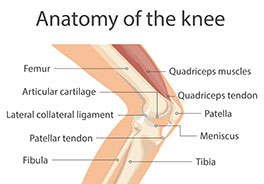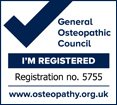Knee Pain Chelmsford

The Knee Joint
The knee joint is the largest joint in the body and is formed of the femur (thigh bone), tibia (main bone of the lower leg) and patella (kneecap). As with other joints in the body it is surrounded by a joint capsule, is filled with synovial fluid and has many muscles, tendons, ligaments, nerves and blood vessels as well as fluid filled sacks called bursae which aid smooth movement of the tendons. The knee also importantly has two additional c shaped pieces of cartilage called the menisci which sit between the femur and tibia.
When someone experiences knee problems, pain can be sharp, achy, localised or more general, and cause stiffness, swelling, locking, giving way, difficulty weightbearing or bending & straightening. This can interfere with sport and exercise and daily activities are often significantly impacted too, for example walking, playing with children & grandchildren, shopping & gardening.
Many people will be familiar with the problem of osteoarthritis in the knee causing pain and stiffness and resulting in knee replacements, but there are many other injuries and conditions that can affect the knee at all ages.
Possible Causes of Knee Pain:
- Ligament injuries
- Tendon strains
- Meniscus tears
- Osteoarthritis
- Patellofemoral pain and tracking problems
- ITB syndrome – often this can affect runners
- Patellar tendonitis
- Osgood Schlatters Disease

How can osteopathy help?
At Oaklea Osteopathy in Chelmsford, experienced osteopath Amanda Miles will assess you fully by taking a detailed case history and examining you. Treatment will depend on your diagnosis and other factors such as age, general health and fitness. Treatment is designed to reduce pain, improve mobility, improve function and improve strength.
Many knee problems respond well to gentle exercises to strengthen the area and if this is appropriate for you, Amanda will provide you with an individually tailored exercise programme.
Occasionally, there may be a need to refer you back to your GP if Amanda thinks you may benefit from further investigation or tests. With knees this can include or x-ray or MRI among others. Amanda will always discuss this with you first if she thinks this is necessary.
Useful Links
Knee Pain
NHS Knee Pain Information






